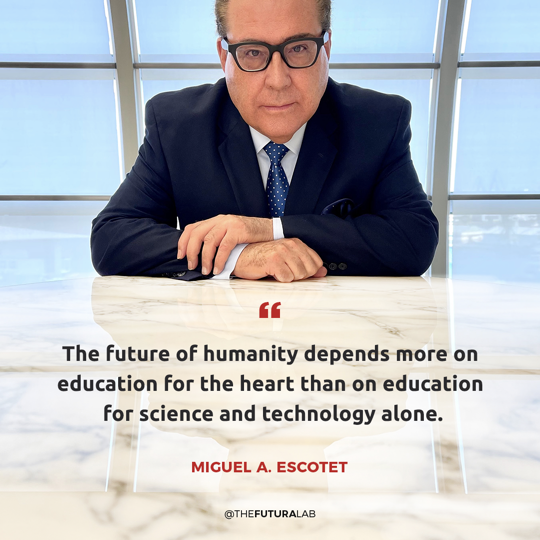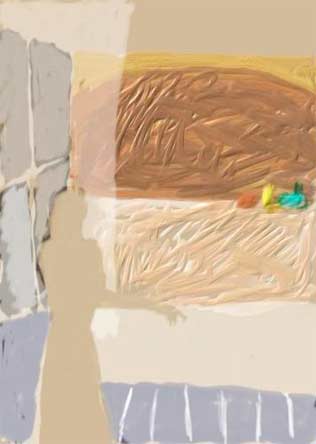
- July 31, 2023
- AI, Education, Emotional Intelligence, Future, Graduation, Higher Education, Pandemics, Student
A message to the students of the Class of 2023, wherever they are, the Class of the Pandemic (2019-2023).
At the beginning of the sowing, we prepared the land, the seeds, and the plow. This sowing was expected to remain the same as the previous ones. This cohort of students reaching the end of their studies has gone through the inclemency of a pandemic, even more substantial than the storms and other severe weather that constantly threaten workers in the fields and at sea. We admire the students of this promotion of the pandemic, their fight against adversity, their disease resistance, their emotional strength of those who lost a loved one, their ability to adapt to study in the solitude of a screen or a computer, their discipline and intelligence capable of transcending diffuse messages, sometimes discordant and always disturbing, in a world facing a torrent of changes against the background of a seriously wounded nature.
When celebrating your academic achievements, students of wherever you are, I would like to highlight some of the Algerian French philosopher Albert Camus’s speech upon receiving the Nobel Prize for Literature in 1957: “Each generation doubtless feels called upon to reform the world. Mine knows that it will not reform it, but its task is perhaps even greater. It consists in preventing the world from destroying itself.”
Camus was saying this while the world was shuddering at the possibility of nuclear war. The threat is still intact, and the problems are even more pressing: we know that for our survival, we need more and more science and technology, but at the same time, we feel that many of our problems derive from the misuse that human beings have made of them. Artificial intelligence is beginning to replace workers with cheap labor, with similar consequences for millions, unless they are willing and able to prepare for the change. At the same time, the same creators of artificial intelligence warn us of the threat it poses to all of humanity, the possibility that this impressive human creation continues to evolve on its own and, by obeying its evolutionary imperative, ends up on its own subdue or destroy the civilization we have created.
But this pessimistic outlook is not the whole truth. We must be optimistic. Scientists, philosophers, intellectuals, people in business, and politicians understand the magnitude of this new exponential revolution and the unavoidable ethical responsibility of channeling it, using the tools that science and technology provide us, channeling it, I repeat so that we can build a future that already We have begun to envision, wherever possible, eradicating hitherto incurable diseases, manufacturing comfortable and welcoming homes at affordable prices for all, providing security and enjoyment during spare time, and designing education for peace, for coexistence, where no talent is lost, and no ambition to know is left unattended. But this requires that society contributes to the general welfare, that all its citizens can find decent work, and that one part of society does not work while another revels in subsidy and procrastination. So, no one demands rights but does not fulfill their duties.
All of this represents possible dreams as long as we do not forget the value of the human heart and do not neglect ethical conduct, which is the conduct that moves us to eliminate pain and injustice in the world.
 I have always insisted, and in these confusing times, it is necessary to emphasize it more than ever: “The future of humanity depends more on education for the heart than on education for science and technology alone.” Without emotional or affective education, we will end up worshiping false gods, or, as Yuval Harari rightly puts it in his book Homo Deus, we will end up building a world where there is no place for us. Because where there is no place for compassion, art, poetry, and the importance of the spirit in our lives, Homo sapiens will not only stop being wise, which is what sapiens means but will stop being human.
I have always insisted, and in these confusing times, it is necessary to emphasize it more than ever: “The future of humanity depends more on education for the heart than on education for science and technology alone.” Without emotional or affective education, we will end up worshiping false gods, or, as Yuval Harari rightly puts it in his book Homo Deus, we will end up building a world where there is no place for us. Because where there is no place for compassion, art, poetry, and the importance of the spirit in our lives, Homo sapiens will not only stop being wise, which is what sapiens means but will stop being human.
As Camus said, you, the young people of today, are called to prevent the values of the spirit from being lost in a ruthless world in which surviving will be a ferocious task where machines, instead of objects, will be subjects that will enslave us. In your brief life, you have witnessed more changes than your grandparents in seventy, eighty, or ninety years. You have seen the rise of wars, the horror of terrorism, the mighty advances of science, and countless electronic instruments. But in that dizzying world, you have had the guidance of your family and school, which have made you understand the emotional limitations of this new world in which you were born.
You know that the education you have received has prepared you to continue learning in constant transformation because lifelong learning is the new norm in this world of geometric advances. You have recognized that knowledge is the power to transform. Likewise, you have experienced disappointment and discouragement in the face of the problems of the world and the country.

You may have intuited that we need ethics in the sphere of government, institutions, and individuals. You can contribute to better solutions to human problems if you remember that we are not in this world to be happy but to earn our right to happiness. It is not worth being happy turning your back on those who will be helpless due to the lack of job opportunities. The narcissistic ideology of me first is invalid because it is a suicidal philosophy in a world that is increasingly transparent and where more people can organize through social networks and other means. It is not worth giving in to self-centered people who mock noble feelings, such as compassion and concern for the weak or the fragility of the environment because they are the ones who undermine the principles on which democratic societies are based. It is worth fighting with the weapons of reason against those who want to run over ethical values and social responsibility so that nothing prevents their rise towards autocratic and destructive power.
I sincerely believe in the youth, and I think, with the futurologist Mal Fletcher, “that nothing is more dangerous for society’s future than having its young people grow old before their time.” Furthermore, it is the duty of human beings of this century, young or old, to prevent their hearts and brains from aging with the poison of indifference or terror in the face of changes.
I remember some verses by Pablo Neruda, a much-loved poet of my generation who, as a form of farewell, said with pain:
You will belong to whoever loves you,
to whoever harvests what I have planted in your orchard.
Today, when the plow passes and we collect the cultivated fruits, I wish that no one cuts in your life the admirable and eternal values that those who love you have planted in your soul.
References
Camus, Albert (1957). Albert Camus’ speech at the Nobel Banquet at the City Hall in Stockholm, December 10. Retrieved at The Nobel Prize Website.
Escotet, Miguel Angel (2023). The optimistic future of Artificial Intelligence in higher education. Prospects (UNESCO-IBE). https://doi.org/10.1007/s11125-023-09642-z
Fletcher, Mal (2012). Youth: The Endangered Species. Seattle: Word Publishing.
Harari, Yuval Noah (2017). Homo Deus: A Brief History of Tomorrow. New York: HarperCollins Publishers.
Neruda, Pablo (1969) Farewell poem. In Neruda/O’Daly (2005) Still Another Day [Aún]. The first authorized bilingual edition by William O’Daly confronted P. Neruda. Port Townsend, WA: Cooper Canyon Press. (Originally, this poem was included in his book Crepusculario, and it was part of the Antología Fundamental. Santiago de Chile. Pehuén Poesía. 1988. Edited by Jorge Barros. 1.ª ed., pp. 31-33).
©2023 Miguel Angel Escotet. All rights reserved. Permission to reprint with appropriate citing.
Illustrations into the text belong from the top to the bottom to Ariel Fianggadha, @TheFuturaLab, and Jaime Nieto as it is seen in the Neruda poem on the Centro Virtual Cervantes.
This article is a slightly Spanish version published by La Voz de Galicia on July 15, 2023 that can be read by clicking here.